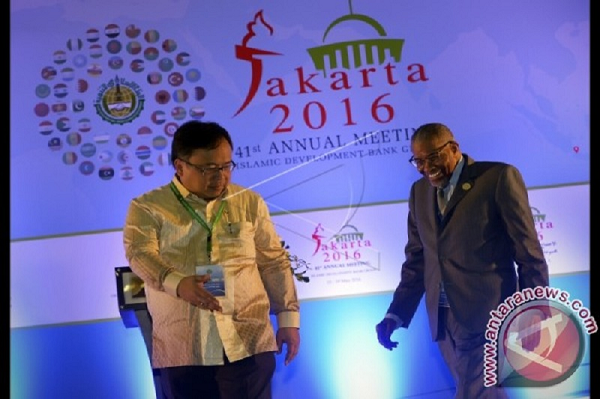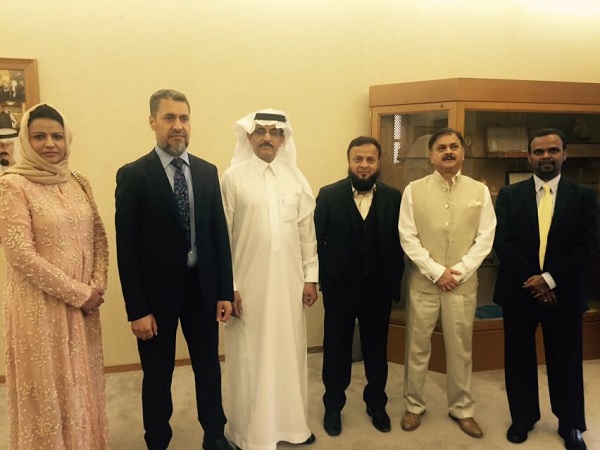
by Editor | May 25, 2021 | Halal Industries

Finance Minister Bambang Brodjonegoro (L) and IDB President Ahmad Mohamed Ali
Jakarta (IINA) – Indonesia is to cooperate with the Islamic Development Bank (IDB) Group in financing several infrastructure programs, one of which concerns the improvement of slum areas, Jakarta Post (JP) reported.
The two sides will sign a member country partnership strategy (MCPS) 2016-2020, covering slum area improvement worth $365 million, electricity transmission worth $350 million and the improvement of four universities and Islamic higher education facilities worth $176.5 million.
“The IDB Group will support Indonesian infrastructure development. The MCPS 2016-2020 will focus on social and physical infrastructure,” Finance Minister Bambang Brodjonegoro said on the sidelines of the IDB Group annual meeting at the Jakarta Convention Center on Monday.
IDB Group President Ahmad Mohamed Ali stated that the bank was committed to supporting the government in dealing with challenges in infrastructure, poverty alleviation and capacity building.
“IDB and the Indonesian government have also cooperated to enhance Indonesia’s financial system,” Ali said, adding that Indonesia contributed to the IDB’s technical cooperation mechanism through its Reverse Linkage Program.
He further said the IDB provided technical assistance to support Islamic finance, both in member and non-member countries.
“In 2015, IDB launched 36 technical assistance programs in seven member countries and 29 non-member countries. Ten of the programs aim to provide emergency assistance to seven member countries and three non-member countries worth $6 million,” he said.
IDB Chief Economist Savas Alpay said that the bank has been providing loans and grants to speed up socioeconomic development in member countries.
According to its 2015 Annual Report, the IDB approved $12.1 billion net loans and grants, up by 13 percent year-on-year.

by Editor | May 25, 2021 | Corporate, Corporate finance, Islamic Banking, News

A historic agreement signed for donation of Medical Mobile Unit by ISLAMIC Development Bank for Rural India with RISE in the presence of HE Khalid Al Aboodi of IDB Honourable Ambassador of India to Saudi Arabia Mr Ahmed Javed and Honourable CG of Jeddah Mr Mubarak at Al Hamra, Jeddah KSA.
By SIRAJ WAHAB
JEDDAH: The Jeddah-based Islamic Development Bank (IDB) has signed a SR200 million agreement with an Indian non-governmental organization (NGO) to provide medical care for poor rural people.
The money is part of a SR1 billion donation which was given by a Saudi benefactor to be utilized for the benefit of poor people across the globe. The benefactor earmarked SR200 million for India, thereby funding 15 mobile health clinics, which the IDB will maintain for the first five years.
The rest of the money is reserved for the deployment of 60 mobile clinics in Pakistan, Bangladesh, Afghanistan, Yemen, Kyrgyzstan and Uzbekistan.

IDB Vice President Sayed Aqa and RISE Chairperson Dimple Kapani sign the agreement at the bank’s headquarters in Jeddah recently. (Courtesy :AN photo)
The benefactor followed the mechanism of the IDB because of the bank’s impeccable record of work in poverty alleviation and health care. The IDB’s funds provide support for countless development projects, emergency response teams, recovery and capacity building. Apart from Palestine, new beneficiaries include Somalia, Niger, Comoros and the minority Rohingya community in Myanmar.
The Mumbai-based NGO, the Rashtriya Institute of Skill and Education (RISE), led by Chairperson Dimple Kapani, is engaged in promoting high-quality medical care for India’s rural poor. It is very active in the Indian state of Rajasthan.

Zafar Sareshwala, Chancellor MANUU with Sidi Saiyed Jali and HE Ahmed Muhammad Ali President of IDB at Crowne Plaza Jeddah.
The aid and assistance from IDB will help RISE buy sophisticated mobile health units that are custom-made for countries such as India. The mobile units are connected to a centralized studio in Mumbai where specialists of top hospitals are present to provide solutions in real time.
Among those present at the signing ceremony was Zafar Sareshwala, chancellor of Maulana Azad National Urdu University (MANUU) and RISE board member.
Welcoming the agreement, he said: “The pact, following so closely on the heels of Prime Minister Narendra Modi’s successful visit to Saudi Arabia, is being seen as one more step in cementing our ties with the Kingdom.”
Sareshwala stated that RISE is also engaged in raising awareness through its flagship outreach program “Taleem Ki Taquat” which focuses on the importance of education for minorities, enabling them to find sustainable employment and improving their standard of living.
“In the six ‘Taleem Ki Taquat’ programs that we have conducted so far all over India, we have been able to bring top federal ministers to our programs. Interaction with them has helped Muslims and other neglected communities solve their problems with practical solutions,” said Sareshwala.
The IDB-funded program will be rolled out initially in rural areas of Maharashtra where RISE already has mobile health units. The agreement with RISE gathered momentum after the recent visit to India by Khaled Al-Aboodi, CEO of the Islamic Corporation for the Development of the Private Sector (ICD). The ICD is IDB’s private sector arm.
Al-Aboodi was also present during the signing ceremony, when the agreement was sealed by IDB Vice President Sayed Aqa and RISE Chairperson Dimple Kapani.
Speaking at the signing ceremony, Aqa said the present agreements with RISE and the previous one with the Export-Import Bank of India (EXIM Bank) are aimed at “establishing bridges with Muslim communities around the world, particularly in India, to promote business ties, educational links and social projects.”
Aqa said: “With India, we have a very good, all-weather relationship. These projects open up many good opportunities for the integration of businesses into the Indian community. We will build on this to further strengthen our relationship. The whole notion is to foster understanding between different communities.”
Kapani thanked the IDB for the funding and said the agreement would boost ties between the two organizations and nations. It will also raise the visibility of the IDB in India because disadvantaged people in rural India will benefit directly from its funds, she added.
Courtesy: arabnews.com

by Editor | May 25, 2021 | Muslim World
 Jeddah, (IINA) – The Board of Executive Directors of the Islamic Development Bank (IDB) has approved financing several major new and also ongoing projects during its 309th meeting here on Tuesday.
Jeddah, (IINA) – The Board of Executive Directors of the Islamic Development Bank (IDB) has approved financing several major new and also ongoing projects during its 309th meeting here on Tuesday.
Four OIC member states – Kazakhstan, Lebanon, Pakistan and Turkey – will receive $466.4 million for development projects.
The Board also decided on opening special accounts for a $176 million project within the context of the “Jeddah Declaration”. The project will enhance the capacity of people to adapt to recurrent droughts in the African Sahel countries of Burkina Faso, Chad, the Gambia, Mali, Mauritania, Niger and Senegal.
Four special assistance grants were approved under the IDB Waqf Fund. A total of $650,000 will go towards education and health care projects for Muslim communities in Canada, Ethiopia, the United Kingdom and Zimbabwe. The grants are in line with the Bank’s continued efforts for socio-economic development and advancement of member states and Muslim communities in non-member countries.
Other major Board approvals include: $273 million to reconstruct the Aktobe-Makat Road project in Kazakhstan; $90 million to assist the polio eradication program (2016-2018) in Pakistan; $82 million to support the Konya PPP Hospital project in Turkey and $20.7 million to construct the Bir-Al Hith Qartaba Road (phase III) in Lebanon.
In addition, a number of important reports were reviewed and the agenda for the 41st Annual Meeting of the Board of Governors scheduled on May 18-19, 2016 in Jakarta, Indonesia, was approved.

by Editor | May 25, 2021 | Halal Industries, Islamic Finance, News
 Kuwait City, (IINA) – President of the Islamic Development Bank (IDB) Group Dr. Ahmad Mohammed Ali has called on experts in Islamic finance to take advantage of existing technologies and business approaches like mobile banking to develop smart Islamic microfinance, according to an IDB press statement.
Kuwait City, (IINA) – President of the Islamic Development Bank (IDB) Group Dr. Ahmad Mohammed Ali has called on experts in Islamic finance to take advantage of existing technologies and business approaches like mobile banking to develop smart Islamic microfinance, according to an IDB press statement.
Such efforts, according to Dr. Ali, could help the Islamic finance industry to be a leader in the global economy, and stay ahead of the competition.
Dr. Ali made the remarks on Wednesday while addressing the opening session of a conference on ‘Islamic Finance: Meeting Global Aspirations’, held in Kuwait City. It meant to prepare ground for increasing financial inclusion and growth, by providing access to finance, regulation and control to support financial stability, development of Sukuk (Islamic bonds) as well as other instruments and forms of long-term financing required to materialize sustainable development.
The conference was inaugurated jointly by the International Monetary Fund (IMF) Chief Christine Lagarde, and the Governor of the Central Bank of Kuwait Dr. Mohammed Y. Al-Hashel.
The IDB President commended the role of the Central Bank of Kuwait in fostering the growth of Islamic finance industry. He also appreciated the role of IMF in developing Islamic finance as a viable equivalent mode of finance. Dr. Ali emphasized that Islamic finance encourages a fair socio-economic system and can address financial inclusion via a two-pronged approach: (i) using risk-sharing financing instruments as viable microfinance, and micro-Takaful tools for individuals, micro-enterprises & SMEs; in addition to (ii) using Islamic redistributive instruments like Zakah, Waqf, Sadaqa and Qard-al-Hasana to provide basic social safety nets (food, shelter, etc.) to the very poor in the society, helping them graduate into economically active individuals.
Dr. Ahmad Ali further stated that “providing microfinance to individuals lacking entrepreneurial skills may lead to less than the desired outcomes”. “What is needed is an integrated finance-plus approach provision of financial services along with provision of related technical skills, regulatory support, assistance for product development and marketing, and increasing market access to SMEs’ products.”
Dr. Ali further underlined the need to develop unique models for increasing access to finance for the SMEs, like creating dedicated SME-financing business units in Islamic banks, and developing the capital markets, Islamic equity and venture capital funds for SMEs. While shedding light on the role played by IDB Group in fostering financial inclusion in IDB Member Countries, Dr. Ali mentioned that as part of the next 10 years strategy, the bank has a dedicated pillar on social inclusion.
The conference, co-hosted by the Central Bank of Kuwait and the IMF Middle East Center for Economics & Finance, provided an opportunity for global policy dialogue among high-level policymakers, including governors of central banks and ministers, regulators, conventional and Islamic standard setters, leading private and public sector financial institutions’ executives, and academics.






